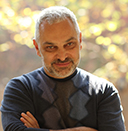A Quote by Marianne Williamson
I don't think that anyone can age in a conscious way and not experience grief.
Related Quotes
Grief is accepting the reality of what is. That is grief's job and purpose-to allow us to come to terms with the way things really are, so that we can move on. Grief is a gift of God. Without it, we would all be condemned to a life of continually denying reality, arguing or protesting against reality, and never growing from the realities we experience.
It is a great thing to be at your age... You are at a very specific time of age ... an age where you can follow all your dreams. But also at an age when you can change-you can change your dreams, you can change paths. When you start something when you're young, you should not decide 'this is it, this is my way and I will go all the way.' You have the age where you can change. You get experience, and maybe dislike it and go another way. Your age is still an age of exploration.
I do think that if you are trying to think empirically about the relationship between conscious experience and the underlying physical reality, wine provides an excellent practical example. Winemakers manipulate the chemicals they are dealing with in a way that is very sensitive to the kinds of effects it will have on the subjective experience of tasters - this is not an accident.
In this day and age, I ask anyone I date right away: 'Are you married? Are you in a relationship with anyone? Does anyone think they're in a relationship with you?' And by the way, if someone says, 'Yes, I am dating other people,' that's not necessarily a deal breaker. But you have to communicate it, not hide it.
I think grief is a huge subject; it's one of the things that everybody is going to confront in one way or another. There's been a lot of books written about how Americans have an odd way of trying to defer grief or minimize the need to grieve. People used to have a lot more ritual grief in their lives. For the most part, we think of it as a strictly temporal process: you grieve for a time and then you're over [it], but it's also a spatial process. It travels across a map.
I think what I was unconsciously expressing in 'Black Rainbow' was a very abstract and metaphorical grief, in the way I had suppressed my grief about my mother dying. In retrospect I realise I started writing 'Mandy' as a sort of antidote to that, to sort of express those emotions, to purge that grief.
Parents have this twisted belief that anyone under the age of about twenty simply can’t know what love is, like the age to love is assessed in the same way the law assesses the legal age to drink. They think that the ‘emotional growth’ of a teenager’s mind is too underdeveloped to understand love, to know if it’s ‘real’ or not.
Whether we experience it or not, grief accompanies all the major changes in our lives. When we realize that we have grieved before and recovered, we see that we may recover this time as well. It is more natural to recover than to halt in the tracks of grief forever. Our expectations, willingness and beliefs are all essential to our recovery from grief. It is right to expect to recover, no matter how great the loss. Recovery is the normal way .
All those years I fell for the great palace lie that grief should be gotten over as quickly as possible and as privately. But, what I've discovered is that the lifelong fear of grief keeps us in a barren, isolated place, and that only grieving can heal grief. The passage of time will lessen the acuteness, but time alone, without the direct experience of grief, will not heal it.
It is what makes conscious of the conditions and laws of observing which applied in this manner become a theme on its own. The activity of consciousness depending on the way the work itself proceeds, becomes the subject of my attention this way and it is precisely because of this voyeuristic attitude toward the own observation and experience of the subject that the conscious analytic dimension in the work shows.



































